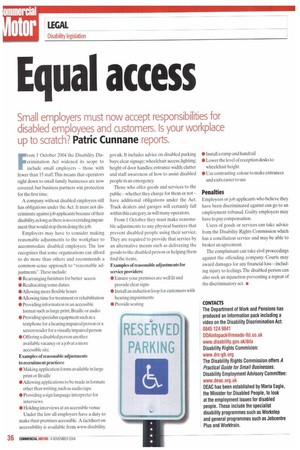Equal access
Page 36

If you've noticed an error in this article please click here to report it so we can fix it.
Small employers must now accept responsibilities for disabled employees and customers. Is your workplace up to scratch? Patric Cunnane reports.
From 1 October 2004 the Disability Discrimination Act widened its scope to include small employers — those with fewer than 15 staff. This means that operators right down to small family businesses are now covered, but business partners win protection for the first time.
A company without disabled employees still has obligations under the Act. It must not discriminate against job applicants because of their disability,as long as there is no overriding impairment that would stop them doing the job.
Employers may have to consider making reasonable adjustments to the workplace to accommodate disabled employees. The law recognises that some organisations can afford to do more than others and recommends a common-sense approach to "reasonable adjustments".These include: • Rearranging furniture for better access • Reallocating some duties *Allowing more flexible hours *Allowing time for treatment or rehabilitation • Providing information in an accessible format such as large print, Braille or audio • Providing specialist equipment such as a textphone for a hearing impaired person or a screen reader for a visually impaired person • Offering a disabled person another available vacancy or a job at a more accessible site.
Examples of reasonable adjustments to recruitment practices: • Making application forms available in large print or Braille • Allowing applications to be made in formats other than writing, such as audio tape • Providing a sign language interpreter for interviews • Holding interviews at an accessible venue Under the law all employers have a duty to make their premises accessible. A factsheet on accessibility is available from www.disability. gov.uk. It includes advice on disabled parking bays; clear signage: wheelchair access; lighting; height of door handles; entrance width: clutter and staff awareness of how to assist disabled people in an emergency.
Those who offer goods and services to the public — whether they charge for them or not — have additional obligations under the Act. Truck dealers and garages will certainly fall within this category. as will many operators.
From 1 October they must make reasonable adjustments to any physical barriers that prevent disabled people using their service. They are required to provide that service by an alternative means such as delivering the goods to the disabled person or helping them find the items.
Examples of reasonable adjustments for service providers: • Ensure your premises are well lit and provide clear signs • Install an induction loop for customers with hearing impairments • Provide seating • Install a ramp and handrail • Lower the level of reception desks to wheelchair height • Use contrasting colour to make entrances and exits easier to use
Penalties
Employees or job applicants who believe they have been discriminated against can go to an employment tribunal. Guilty employers may have to pay compensation.
Users of goods or services can take advice from the Disability Rights Commission which has a conciliation service and may be able to broker an agreement.
The complainant can take civil proceedings against the offending company. Courts may award damages for any financial loss — including injury to feelings. The disabled person can also seek an injunction preventing a repeat of the discriminatory act. •






























































































































































































